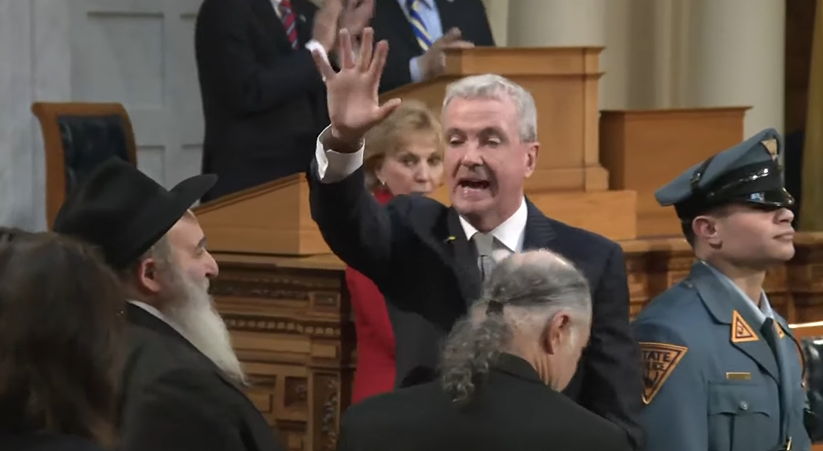Elections Transparency Act Bill Signing No Cause for Celebration

When Gov. Phil Murphy puts official pen to paper and affixes his signature to the grotesquely misnamed “Elections Transparency Act”, it’s certain he’ll do so in the privacy of his office removed from the kind of public ceremonies heralding important legislation but more importantly, in this case, away from what would certainly be a deluge of questions from the assembled reporters.
There will be no lofty speeches from the governor or the legislation’s sponsors, no souvenir pens for the governor to hand out as mementos of the event. Rather, his office will distribute a news release marking his writing this widely criticized proposal into law — perhaps even at five o’clock on a Friday afternoon, traditionally the most politically advantageous time to toss bad news into the weekend vacuum and send it spiraling into the death valley of media attention.
Keeping attention at a minimum is a tacit admission of a level of shame attached to the bill signing, a recognition that despite hanging the “transparency” code word on it, the measure is the culmination of the Administration’s effort to force the executive director of the Election Law Enforcement Commission out of his job while, at the same time, turning the 50-year-old agency into little more than a filing cabinet.
Whatever concerns candidates or political organizations may have had concerning running afoul of ELEC regulations will disappear and copious amounts of cash will flow freely into a system already awash in it.
In the swipe of his pen, Murphy wiped out some 80 percent of the complaints pending before the Commission by imposing a two-year limitation on investigations and applying it retroactively.
Contribution limits will increase, pay to play laws will be gutted, and a housekeeping fund will be created to accept contributions with no oversight.
The executive director, Jeff Brindle, has served the agency for 38 years, the last 14 as its director. When the governor and his staff failed to force his resignation, they attempted to change his job status to one serving at the governor’s pleasure. When that failed, the legislation was amended to authorize the governor to appoint directly the four members of the commission whose qualifications would be to follow the Administration’s orders and dismiss Brindle.
Upon Assembly Approval of the legislation, the three current Commissioners resigned immediately, submitting blistering departure letters accusing the governor of destroying the Commission, eliminating its independence and replacing it with appointees and officers who would adhere to the political demands of the chief executive.
The nonpartisan enforcement of campaign finance laws will be replaced by a partisan influence undermining public confidence in a fair, open and honest election process.
Despite a record free of any scandal and notwithstanding Brindle’s exemplary service, the agency was rendered powerless and its director victimized in an act of political retribution by an Administration unhappy with his public advocacy for lifting the veil of secrecy on the identity of contributors to so-called “dark money” political action committees.
The entire episode does, though, provide some insight into the pattern of behavior of the Administration when faced with controversial political issues — stonewall, comment publicly as little as possible, maintain radio silence, deflect media questions, refuse to respond and ride out the public relations storm in the belief attention will fade, the public will tire of it and other issues will emerge to overshadow it.
Whether it was the accusation of sexual assault brought against a campaign staffer, the tragic COVID-19 mortality rate in nursing homes and veterans’ facilities, or the unprecedented judicial vacancy rate in the Superior Court system, the Administration response was dodge and deflect, buy time for interest to diminish and move on.
Any questions raised brought boiler plate e-mail responses — “we’re working on it”, etc.— but nothing of substance.
Even as opposition grew to the ELEC proposal, the governor and his top staff remained silent, leaving explanations and rationale to Democratic legislative leadership.
In the vernacular, the deal was wired, votes were committed and the outcome — bare majorities of 42-30 in the Assembly and 21-12 in the Senate — pre-ordained.
It illustrates also the diminished influence of the media, beset by economic headwinds, forced to reduce staff and coverage and lacking the resources to pursue investigative journalism.
It is no longer the feared institution it once was, shorn of its power to influence policy debates, marshal public opinion in behalf of a cause, or hold public officials accountable for their actions.
Editorial commentary and analysis still exist, of course, but can be routinely ignored or its impact blunted by the overwhelming presence of social media and alternative news sources.
The warnings sounded over the past several years that the loss of newspapers or the erosion of their ability to compete or dominate the market will lead inevitably to a less-informed public and a more secretive government have come to pass.
No matter if one views the Washington Post as a propaganda mouthpiece for the far left, its’ motto “Democracy Dies In Darkness” is undeniably relevant.
The “Elections Transparency Act” — a mockery to be sure — is now law. ELEC still exists and will limp along in a dramatically weakened condition until it becomes nothing more than a budget line item or a spot on a government organization chart.
Murphy, who prides himself on his boast of being the most progressive governor in the nation, has revealed himself to be the most political as well when it suits him.
A private signing is understandable — there’s nothing to celebrate.
Carl Golden is a senior contributing analyst with the William J. Hughes Center for Public Policy at Stockton University.








Leave a Reply